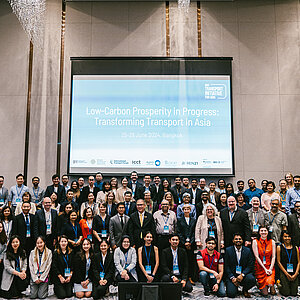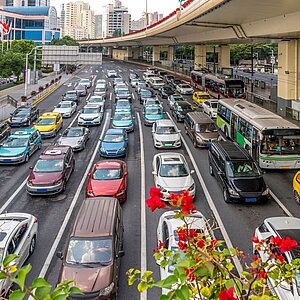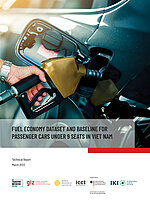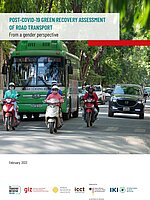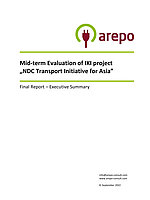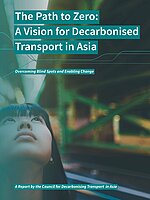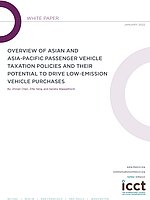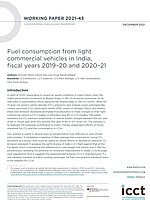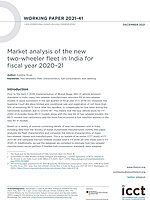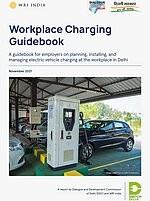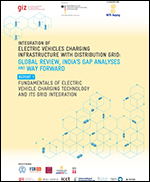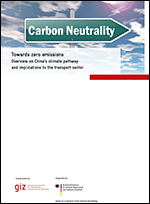NDC Transport Initiative for Asia
Rapid economic growth, together with a persistent trend towards urbanization and a rise of motorized transport are leading to an increase of traffic volumes in Asia. This leads to an increase of greenhouse gas emissions and severe air pollution. The NDC Transport Initiative for Asia, a joint program of seven organizations, promotes an integrated approach to the decarbonisation of transport. In each partner country, the initiative is supporting stakeholder processes and the development of measures for climate change mitigation. As a result, the project helps its partners to make their sectoral contributions to increase their NDCs, and to take a more ambitious approach to long-term strategies and the 2025 NDCs. As a regional initiative, the project shares its knowledge throughout Asia and promotes regional discourse on the need for net zero carbon transport. At the global level, the program disseminates and exchanges insights within the UNFCCC process.
- Countries
- China, India, Viet Nam
- IKI funding
- 19,750,000.00 €
- Included preparation phase
- 227,018.03 €
- Duration
- 11/2019 till 08/2025
- Status
- open
- Implementing organisation
- Deutsche Gesellschaft für Internationale Zusammenarbeit (GIZ) GmbH
- Political Partner
-
- Ministry of Ecology and Environment - China
- Ministry of Transport - Viet Nam
- National Institution for Transforming (NITI Aayog) - India
- Implementing Partner
-
- Agora Transport Transformation gGmbH
- International Transport Forum (ITF)
- Partnership on Sustainable, Low Carbon Transport (SLoCaT) Foundation
- REN21 Secretariat (Renewable Energy Policy Network for the 21st Century e.V.)
- The International Council on Clean Transportation (ICCT)
- World Resources Institute (WRI)
State of implementation/results
- Regional:
- The Council for Decarbonising Transport in Asia launched its flagship report “The Path to Zero: A Vision for Decarbonised Transport in Asia” at the ADB Transport Forum in April 2022.
- The project contributed to the consultations and goal formulation of the Aichi 2030 Declaration of the Environmentally Sustainable Transport Forum.
- The Peer Network for Transport and Climate in Asia was set up and held seven virtual sessions on sustainable transport.
- Co-organization of the Transport and Climate Change Week in 2021, 2022, 2023 and 2024.
- The Women on the Move network was created and it organised regular Connect and Chat sessions and a year-long mentorship programme. In its second year, the network will be facilitating expert exchange in the project regions and at international events.
- In July 2023, the project highlighted the need to act on tansport decarbonisation during the Indian G20 presidency, through side-events and publications.
- The project organised the regional conference "Low-Carbon Prosperity in Progress: Transforming Transport in Asia", bringing together around 130 participants from 15 countries to exchange on policy developments for decarbonising transport in Asia.
- NITI Aayog and WRI initiated the National Forum for Decarbonising Transport in India in August 2021 as a platform for multi-stakeholder dialogues and consultation of policy recommendations.
- The Delhi government developed a detailed operational guideline to implement a 5% interest rate subvention in January 2022 with the support of the project.
- Several international reviews and India-focussed studies on EV battery, charging infrastructure grid integration and business models, as well as on battery recycling related topics were published.
- In January 2023, the Transport LCA Tool for India was launched, the first of its kind adapted to the Indian context.
- In September 2023, the report "Gap analysis and Recommendations for EV Integration in India" was launched together with NITI Aayog.
- Recommendations for the design of FAME III (Faster Adaptation and Manufacturing of Electric Vehicles Scheme) were submitted to NITI Aayog.
- Created by the project, the Digital Librabry on Green Mobility has over 125,000 views and is contributing to global knowledge enhancement.
- Through Uddeshya, an annual conference on transport and gender, NDC TIA strengthened gender responsive approaches, bridging the gaps between communities and decision-makers.
- The technical studies on charging infrastructure and grid integration have informed the forthcoming 2047 Electric Vehicle Roadmap of the Government of India.
- In 2025, GIZ provided a technical report on finance readiness for green transport.
- The project supported the transport section in Vietnam’s Green Growth Strategy and Action Plan spearheaded by the Ministry of Planning and Investment (MPI).
- The design of a digital MRV system for Vietnam’s transport sector is currently being finalised by the Ministry of Transport (MoT).
- Support on technical report preparation was provided during development of the action plan of GHG emission mitigation implementation under Decree 06/2022/NĐ-CP issued by MoT.
- In 2022, the city-level electric mobility action plan for HCMC was delivered. It was integrated into the city master plan under resolution 98/NQ-TW during 2023.
- Trainings on the TIMES model related to emissions inventory, modelling and forecasting have been provided to several ministerial stakeholders, supporting the implementation of the Law on Environment 2020, the integration of transport and energy models, and the projection of transport scenarios up to 2050.
- Support in the development of the e-mobility concept for the Resource Mobilization Plan (RMP) of the Just Energy Transition Program (JETP).
- Support in preparing the Fuel Economy Dataset and Baseline for Passenger Cars under 9 Seats and Motorcycles/Mopeds to serve the development of Fuel Economy Standards was provided.
- In May 2024, the project submitted a net-zero scenario analysis in the transport sector by 2050 to the Ministry of Transport. It informs the 2025 NDC update and contributes to the Ministry's action plan.
- The project provided Hanoi and Ho Chi Minh City with technical knowledge for the development of subsidies for e-buses. The Department of Roads will use the learnings to guide subsidies for other cities in Vietnam.
- In November 2024, GIZ and Peking University, Lincoln Institute Center for Urban Development and Land Policy organised an exchange for transport experts and university students on gender-responsive urban and mobility planning.
- Policy recommendations were provided to the Ministries of Environment and Transport during the development of the transport sector elements of the “1+N policy system for CO2 peaking and carbon neutrality.
- Policy recommendations were provided on fuel consumption and a policy briefing on “Opportunities and pathways to decarbonize China's transportation sector during the fourteenth Five-Year Plan”.
- Capacities on emission modelling and MRV systems of 50 participants representing over 20 Chinese cities were improved.
- A national advisory council of Chinese transport experts was established in December 2021 to review policy recommendations; it has held three annual meetings.
- Contributions on CO2 emission control and standards were made to China Annual Report of Emissions from Mobile Sources.
- The stakeholder platform for Guangdong province established in 11/2021 has released policy recommendations on "Pathways to Decarbonise the Road transport Sector in Guangdong, China".
- In October 2023, project partners organised a study tour on German and European vehicle GHG regulatory design for the Ministry of Ecology and Environment and its affiliated research institutes.
- National and provincial advisory councils of Chinese transport experts were established. They review policy recommendations on roadmaps for decarbonising transport, provide guidance on project activities and discuss preliminary project outputs. Both councils held three annual meetings each.
- The project organised over 20 workshops on international and Chinese policies for motor vehicle emission control, possibilities of zero emission ports and emissions accounting methodologies. Key findings on the development of transport emission reduction strategies fro Guangdong were shared with provincial stakeholders.
- The International Council on Clean Transportation (ICCT) in collaboration with the Vehicle Emission Control Center, conducted a set of technical studies, reviewing policies related to China's NDC targets in the transport sector, heavy and light-duty vehicles and emission standards. They laid the ground for new multi-pollutant vehicle emissions standards, for the first time limiting greenhouse gas emissions (including CO2 and CH4).
Latest Update:
04/2025
Further links
- Twitter-Account
- Overview of Battery recycling Ecosystem: Stakeholder Identification and perspective on Environment, Health & Safety Aspects
- Comparative Analysis of Electric Vehicles and Internal Combustion Engine Vehicles from Resource Efficiency Perspective
- Towards Decarbonising Transport 2023: A Stocktake on Sectoral Ambition in the G20
- Life-Cycle Assessment of Passenger Transport: An Indican Case Study
- Fuel Economy Dataset and Baseline for Passenger Cars under 9 Seats in Viet Nam
- Greening the Future: Hanoi Embraces Sustainable Mobility with Economic Technical Norms for Large Electric Buses
- Visioning to Implementation: Transport Decarbonization Policies that Match National Climate Targets in China, India, and Vietnam
- Climate and air quality benefits from accelerating electrification of Guangdong’s on-road transportation
Project relations
Legend:
The link has been copied to the clipboard




